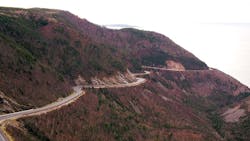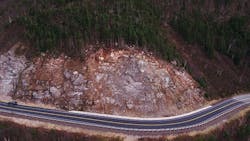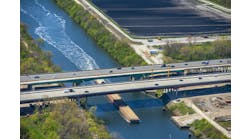Sections of the Cabot Trail within Cape Breton Highlands National Park exhibited severe frost-related distortion and deterioration.
Moreover, areas of the surrounding cliffs were showing indications of slope failure. Project leaders took a collaborative approach to provide a long-term solution for the highway and its related assets.
Stantec led the preliminary and detailed design, as well as contract administration and construction management of a multi-phased roadway rehabilitation project on the trail between the French and MacKenzie mountain ranges, a distance of approximately 22 kilometers. The remoteness of the location, relatively harsh climate, and short construction season added to the challenges that the contractor faced, impacting productivity and schedule. However, the designer worked closely with contractors to mitigate the challenges and deliver a rehabilitated infrastructure under the estimated construction budget and within the scheduled construction season.
This project limits were defined as beginning at KM 11.3 (Base of French Mountain) to KM 33.2 (MacKenzie River).
Work included asphalt replacement and strengthening, adjustments to the horizontal and vertical geometry, and a new, wider typical cross-section to provide for a usable paved shoulder for cyclists. There were multiple horizontal curves below the minimum standard design speed; however, upgrading these locations was not practical or economically feasible, so these areas were appropriately marked and signed to provide proper warning to travelers. The vertical roadway geometry through the project area met the design criteria for the posted speeds, which ranged from 50 km/h to 80 km/h, which meant no profile adjustments were necessary.
Detailed hydrology and hydraulics assessments were conducted on the culvert crossings, and new culverts were designed to replace the deteriorated and undersized pipes. Improvements were also made to the watercourses with the provision of energy dissipation pools and riprap-lined channels to help reduce erosion.
The cliffs along sections of the Cabot Trail go through constant degradation from pounding surf at the base, as well as freeze/thaw and wetting/drying processes. As the roads through the trail are cut into these cliffs, significant slope movements can affect the roadways. Concurrent to this project, Stantec had been carrying out a multi-year slope stabilization program of highway cuts and coastal slopes in the Cape Breton Highlands National Park. That program consisted of an inventory, inspection, and hazard rating of all slopes within the park, followed by six remedial programs to stabilize a total of 14 highway cuts and one coastal downslope. In 2019, the sixth remedial slope program was combined with the French-to-MacKenzie road rehabilitation project to deliver multidisciplinary services and stabilize three rock cuts from KM 11.3 to KM 15.9.
The rock slope stabilization programs consisted of a combination of rock slope scaling, rock anchor installation, removal of rockfall debris from the catchment ditch, and in select areas, the installation of low-impact barriers to enhance catchment ditch effectiveness.
“Our project team was extremely proud to work on a roadway as iconic and as beautiful as the Cabot Trail,” Rodney Blanchard of Stantec told Roads & Bridges. “The remoteness of roadway sections, steep topography, challenging rock faces, and coastal drop-offs to the Gulf of St. Lawrence made this no easy task.”
Steve Babstock, with owner Parks Canada, added, “A big part of the roadway’s beauty is its remote location and rugged surrounding terrain. Parks Canada is proud of this achievement, which has resulted in an improved traveling experience and enhanced safety for all those that have the opportunity to travel this scenic roadway.”




